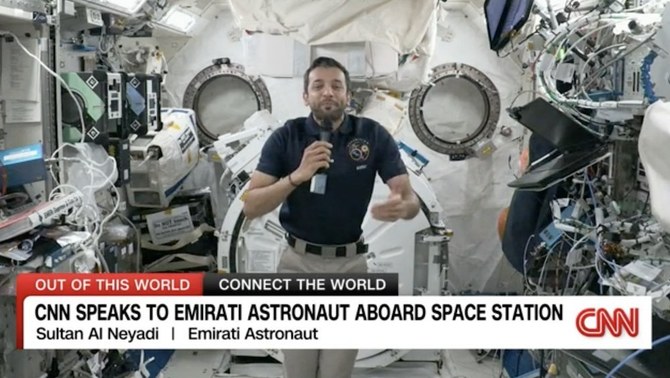LONDON: Emirati astronaut Sultan Al-Neyadi’s mission on board the International Space Station is pushing the UAE to the forefront of space exploration, the country’s space chief told CNN last week.
Al-Neyadi, who has spent three months making repairs on the ISS and conducting experiments for NASA, was the first Arab to be deployed on a long-term space mission and has become the first person from the Arab world to perform a spacewalk.
He described the experience as a “dream come true” in an interview with CNN’s Becky Anderson, who spoke to Al-Neyadi from the Mohammed bin Rashid Space Centre in Dubai.
He said: “It (the spacewalk) was (a) really great feeling, just to see that you are floating in a spacesuit.
“It’s just like a small spacecraft. It provides oxygen and CO2 scrubbing and cooling, and what is preventing you from dying is just a small layer of glass.”
Al-Neyadi also gave Anderson a tour of the ISS during the interview, ran through the types of experiments he is carrying out, described how he manages to keep fit at zero gravity, and how weightlessness affects astronauts for an extended period of time.
Anderson also spoke to MBRSC Director-General Salem Al-Marri, who said space exploration was a key part of the UAE’s strategy of moving its economy away from a dependence on oil.
He said: “Our objective is always to try and do these exciting projects that really put the UAE at the forefront of exploration.
“It’s all about data. They say the new gold or the new oil is data.”
Al-Marri told Anderson that he is looking forward to seeing the potential of the UAE’s satellites fulfilled following their success at tracking data on climate change and urban growth.
He added: “If you’re tracking cars, if you’re looking at planes, environmental purposes, whatever it may be, there’s hundreds if not thousands of applications that you can use from one image.”
Speaking about the MBZ-SAT, he added: “What’s beautiful about this satellite is it’s fully designed by our team here.
“All of the project management, every single piece you see here is designed and project managed by our team.”
Al-Marri added that space exploration, and tourism in the cosmos, had the potential to be a joint venture between governments and the private sector.
He said: “Space is predominantly government-led, so there’s big investments from government because of the need for these types of satellites.
“But that doesn’t mean the private sector cannot lead the development.
“In a country like the UAE, this is funded by the government, it’s supervised by the government, but the private sector now is building it.”




























